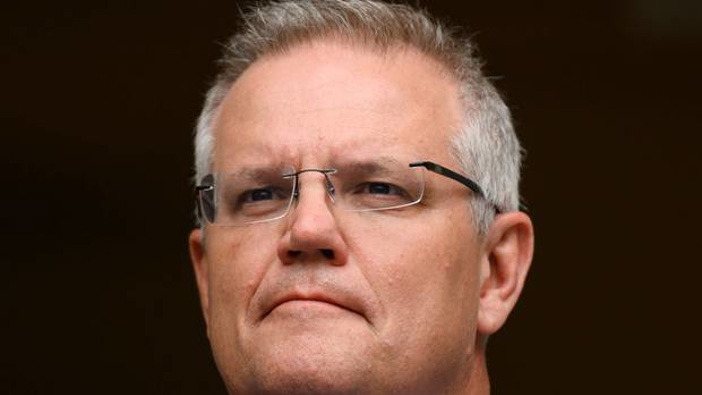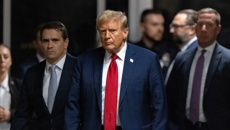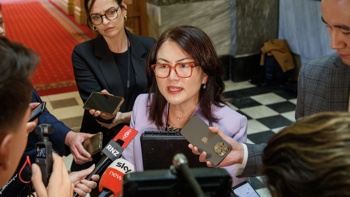Follow
the podcast on

Small businesses “will certainly” get cash payments as part of the Morrison Government’s coronavirus stimulus package, reports suggest.
The Morrison Government is putting the final touches on its plan, which is expected to be worth up to $10 billion.
On Wednesday it will announce a $2.4 billion package to deal with the health impacts of the coronavirus outbreak including creating a new Medicare item for telehealth services so people can be treated at home.
There will also be 100 fever clinics set up around Australia to test those who think they may be sick.
Prime Minister Scott Morrison has not announced other measures yet, including whether one-off payments will be included in the package, but reports suggest small business, pensioners and Newstart recipients could be in line for a cash boost.
Sky News Political Editor Andrew Clennell said the health and aged care sectors, and small businesses are expected to be big winners.
“The package will include hundreds of millions for health and aged care, I can reveal. Nursing homes are helped out in terms of dealing with the crisis; GPs are helped in terms of them dealing with the crisis, in terms of screening and in terms of care in the community,” Mr Clennell said.
“We have already seen a commitment for a billion dollars for health and now we see this extra of hundreds of millions for the aged and care and health sector.”
He claimed the government’s plan will also see export costs temporarily axed and that small businesses will receive cash payments.
“There will certainly be cash payments, I am told, to small businesses,” Mr Clennell said.
“As I understand it the committee was told there is an expectation of this crisis lasting around six months before a bounce back. That is what the government is planning for at the moment.”
On Tuesday, The Australian reported that pensioners and Newstart recipients are also being considered for cash payments.
Meanwhile, during an appearance at the Australian Financial Review Business Summit in Sydney on Tuesday, Prime Minister Scott Morrison called on businesses to support their staff and show “patriotism” as the impacts of the coronavirus hit Australia’s economy.
He said all Australians had a part to play in helping the country moving successfully through the crisis, describing it as “one of those national interest moments”.
“Whatever you thought 2020 was going to be about, think again,” he said.
“We now have one goal together this year – to protect the health, the wellbeing, and livelihoods of Australians through this global crisis, and to ensure that when the recovery comes – and it will – we are well positioned to bounce back strongly on the other side.”
BUSINESSES URGED TO HELP STAFF
During his speech, the Prime Minister outlined seven principles that would guide the government’s response.
He said large business in particular had a huge role to play, commending Australia’s banks for passing on interest rate cuts and Qantas’s role in getting Australians out of China.
“We need your perseverance, your planning, your enterprise,” he said. “We need your common sense. We need your calm. We need your commitment. But we need your patriotism as well.
“We need you to support your workers by keeping them employed. Hold on to your people, because you will need them on the bounceback on the other side.”
Mr Morrison urged businesses to support their staff as much as possible, including with paid leave if they need to take time off. Big business were also asked to support small business suppliers by paying them promptly.
“Pay your suppliers not just in time, but ahead of time, especially now,” he said.
“You want to know what you can do to keep Australians in jobs? Keep businesses in business? And support Australia through this crisis? If you’re a large business, go back to your office today, pay your supplier invoices, and commit to pay them even faster for the next six months.
“That is what sticking together looks like.
“How you support your customers, your suppliers, your employees during the next six months and potentially beyond will say more about your company, your corporate values, and the integrity of your brand than anything else you’ve likely done as an organisation.”
However, as the PM was making his speech, Qantas was announcing it would be making drastic cuts to flights, reducing capacity by almost a quarter over the next six months, due to fears over COVID-19.
ONE-OFF CASH HANDOUTS BEING CONSIDERED
Though the Morrison Government has previously criticised Labor for its “cash splash” stimulus package to the global financial crisis, Sky News Political Editor Andrew Clennell recently revealed a similar approach may not be ruled out.
He said Mr Morrison is in discussions with his team for ways to distribute close to $10 billion in stimulus to help the economy, and is considering a Kevin Rudd-style cash handout as part of the package.
Clennell said “even cash handouts to ordinary citizens” were still “on the table” but the idea was facing fierce opposition from Finance and Treasury officials who were reluctant to offer the package to ordinary citizens.
“Even cash handouts to ordinary citizens are still on the table as the Government wrestles with its stimulus package,” Clennell said.
“I understand cash handouts similar to what occurred in the Rudd era have not been ruled out but Finance and Treasury officials are said to be pushing back against this sort of stimulus and the PM would seem reluctant on it as well.”
STOCK MARKET SET FOR ANOTHER PLUNGE
The PM’s comments come as Australian shares braced for another plunge after the ASX recorded its worst day since the Global Financial Crisis on Monday, falling 7.3 per cent and shedding $140 billion.
Investors were keeping a close eye on the PM’s speech today but IG market analyst Kyle Rodda said it won’t stop the bottom of the market from falling out.
“It’s certainly not going to turn the tide in equities because we’re trading more on global scenes,” Mr Rodda told news.com.au.
“There’s probably the argument to be made if you talk to someone in the market right now, rightly or wrongly, the government’s been a little bit too slow to respond with promises of fiscal stimulus.”
AMP chief economist Shane Oliver agreed, saying any respite offered from the government would be reserved for when the panic eventually dissipates.
He told news.com it was clear global markets were currently “driven by fear” and “bad news is still dominating”.
“The stimulus plan will help, as did last week’s interest rate cut, they’ll help soften the blow but until we can get more confidence that the worst of the economic impact is in sight, then markets remain at risk,” Dr Oliver said.
“It’s probably not going to occur until the dust settles.”
SEVEN PRINCIPLES TO PACKAGE
Mr Morrison told the AFR forum the government’s objective was to keep people in jobs, keep businesses in business, and ensure the country bounced back stronger on the other side.
“It’s about supporting community confidence, employment and business continuity,” he said.
“This means boosting domestic consumption, reducing cash flow pressures for the most vulnerable businesses, and supporting new investments to lift productivity.”
The Prime Minister listed seven principles that would guide the government’s response.
He said the first principle was that measures be proportionate to the degree of economic shock and the impact on the economy.
“Secondly, they need to be timely and scalable, so they can be adjusted appropriately as the health and economic effects evolve,” he said. “This is a dynamic situation we’re in.”
Thirdly, the response needed to be targeted to address the specific issues Australia was confronting, supporting those most affected, and delivered where it would be most effective.
“We must not waste taxpayers’ resources,” he said.
Fourth, the response needed to be aligned with the many other arms of policy and activity, in particular monetary policy, and with the responses of other governments, particularly at a state and territory level.
In a swipe at Labor’s GFC stimulus, Mr Morrison said the fifth principle involved using “existing delivery mechanisms wherever possible”.
“That’s where it goes pear-shaped, if you get that design wrong, as we learned from the last stimulus,” he said. “We saw those mistakes of trying to rush a range of new programs in response to the GFC.”
Sixth, he said the measures must be temporary and accompanied by a fiscal exit strategy.
“We cannot bake into the bottom line this response for years to come, holding the budget under water.
“And, finally, we must favour measures that will lift productivity to enable the Australian economy to sustain an even stronger growth trajectory than we were on prior to the crisis.
“By following these principles, we believe we will protect the structural integrity of the budget, we will maximise the impact of the measures to protect the livelihoods of Australians and our economy during this difficult period.
CORONAVIRUS IMPACT COULD BE BIGGER THAN GFC
Mr Morrison said the coronavirus outbreak could potentially have greater economic impacts on Australia than the Global Financial Crisis and that it is important for the government to “learn from the mistakes” made during that time.
“COVID-19 is a global health crisis, but it also has very real and very significant economic impacts, potentially greater than the global financial crisis, especially for Australia,” he said.
“The epicentre of this crisis as opposed to that one is much closer to home.”
Mr Morrison said the GFC impacts were centred on the North Atlantic and back then China was in a position to cushion the blow for Australia.
But the coronavirus crisis has seen consumers stay away from shops and workers away from work. Manufacturing output in China fell sharply in February.
“Relative to SARS in 2013, China is substantially larger and more interconnected with the global economy, including to Australia, magnifying the reverberations throughout the world,” Mr Morrison said.
“An early sign of the hit to our economy was the sharp fall and demand for our rock lobsters, which make up about half of the value of Australia’s seafood exports.”
He said more than 100,000 Chinese international students were not in Australia when the travel ban was actioned.
“It has moved quickly to weaken demand, disrupt supply chains, crunch cash flows, especially for small and medium-sized businesses,” he said.
However, Mr Morrison said it must be remembered that the problem was a temporal one, and not a structural one.
“It’s about a biological contagion, not a financial one,” he said. “In our response, we must be careful to solve this problem, the one we’re facing now, not the last one.
“And we need to solve it for Australia, for our circumstances, and not appropriate the diagnosis for other economies.”
The Prime Minister said there was a need to learn from mistakes made during the GFC, especially when it came to a clear fiscal exit strategy.
“The range of possible economic outcomes will depend on the spread, severity and duration of the health crisis and its interaction with demand-side and supply-side effects.”
The stimulus package has been tipped to include tax incentives to help businesses with cash flow, alongside tax deductions for new investments.
Funding will be also aimed at infrastructure spending, which normally translates to major road and rail projects.
“It will be worth billions in the terms of the impact it will have,” Treasurer Josh Frydenberg told Sky News last week.
“The package of measures will be responsible and will be scalable.”
Take your Radio, Podcasts and Music with you









